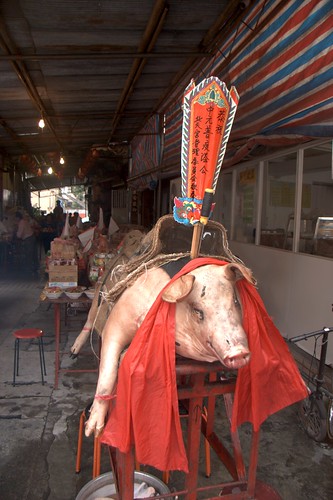Taiwan’s politicians and political parties should pay closer attention to major and interesting changes taking place in the Japanese political system.
Earlier this month, the upper house of the Japanese Diet vetoed the postal service privatization plan of Prime Minister Junichiro Koizumi.
Koizumi took this action as a sign of “no confidence” of the reform program of his right-wing Liberal Democratic Party-New Komeito Party government and decided to dissolve the current Diet and call for general elections, which will take place on September 11.
The poll will mark the first time that a general election to elect a new lower house will have been called by a prime minister in the wake of a defeat by a proposed bill by the House of Councilors.
Moreover, thanks to another division in the ruling LDP triggered by the controversy over the postal service privatization scheme, it is by no means certain that the LDP will be able to maintain a majority in the September 11 election, with or without the assistance of New Komeito.
During the years of Koizumi’s premiership, the trend in Japanese politics to “oppose factional bosses and oppose bureaucrats” has become increasingly evident.
In other words, the fading away of the traditional central concepts of “interests and connections” in policy debates has now become a mainstream trend in Japanese parliamentary politics.
Contemporary Japan is no longer a polity dominated by sterile “opposition for the sake of opposition,” but is now increasingly characterized by a growing focus on national interest as the main determination in political tendencies and orientations.
Japanese politics can thus be said to be progressively becoming more mature.
Moreover, in contrast to the previous focus on personal ties over political positions, the new trend is for politicians with sharply different advocations and stands to cease cohabitation in the same political party.
‘Political responsibility’
Therefore, Koizumi has refused to re-nominate LDP Diet members who opposed his postal privatization bills and even, in emergency Cabinet meetings, sacked ministers who openly objected to the dissolution of the Diet.
In addition, a former Diet speaker and four other LDP heavyweights who voted against the postal privatization bills submitted their resignations from the ruling party on the same day of the crucial Diet vote and commonly decided to form a new “People’s New Party.”
In our view, such actions reflect a proper sense of “political responsibility.”
Nevertheless, while Taiwan has experienced over a decade of democratic parliamentary politics (counting from the holding of the first genuine Legislative Yuan election here in December 1992), the dominant value systems in substance of most politicians remain personal or partisan interests.
Unfortunately, not only are the actions of politicians swayed mainly by personal interests or partisan considerations, but so is the behavior of many if not most voters.
As a result, the main determinant of voting behavior is not a party’s or politician’s political vision or policy appeal, but rather following the lead of “ward bosses” or factional chiefs and the pursuit of narrow and highly partisan definitions of “welfare.”
Politicians with sharply different views or even divergent notions of national identity are regularly nominated by the same political party and, in turn, they frequently work to undermine the political bases of their “party comrades” in order to advance their own personal or factional interests or to seize political power.
Real motives
Certainly, Taiwan has already reached the stage in which “the counting of heads has replaced the cutting of heads” as the main means to decide political power, but we must seriously ask ourselves whether our current political ecology can truly be described as a “democratic society.”
Politics absolutely should not be divorced from the people. However, the advocations and judgments of the people are rarely visible in the daily operations of Taiwan’s political party system.
Instead, the bulk of the news media and politicians are feverishly occupied with trying to deceive the people or keep them in the dark about the real motives and issues at stake in our political life through activities that smack more of fundamentalist revival meetings than rational or substantive political discussion or discourse.
As a result, Taiwan society remains deeply ideologically divided between dogmatic “blue” or “green” quasi-religions that mask the nature of the real interests, problems and questions that our citizenry must decide.
In this state of affairs, politicians are either using the media or being manipulated by the media. In any case, what neither the bulk of the media nor most politicians are inclined or able to realize is substantive policy discussions on issues.
Politics is Taiwan is mostly for show and fails, no matter how extremely views may be offered, to be “radical” in the sense of dealing with fundamental matters.
We hope that factional politics and dogmatic ideological strife can “wither away” from Taiwan political life, along with related maladies such as quasi-religious mobilization, vote buying and “voting for the winner.”
We hope Taiwan’s political parties will begin to display the signs of maturity that are now surfacing among Japanese politicians and shift the focus of debate and decision to what is in the best interest of our society and our people so that genuine democracy can finally emerge in Taiwan.









